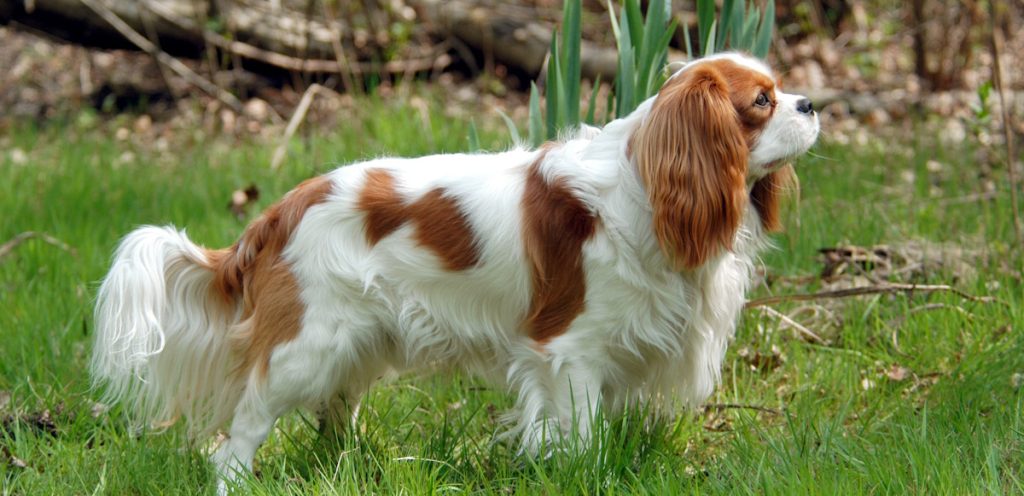Imagine strolling through a sunny park and spotting a small, elegantly poised dog with a silky coat and expressive eyes that radiate warmth. This is the Cavalier King Charles Spaniel, a breed with an affectionate personality that seems tailor-made for companionship.
As you watch the spaniel nuzzle its owner, you can’t help but be drawn to its charming demeanor and sociable nature. You may be considering this breed for your next pet, attracted by its reputation for being loving and good with children.
However, what you see in the park is just a glimpse of what it’s like to have a Cavalier King Charles Spaniel in your life. You’re likely curious about what it takes to care for such a breed, how they interact with other pets, and what health issues they might face. Each aspect of their profile is a piece that completes the puzzle of whether this dog is the perfect fit for your home and lifestyle.
- Noise Level
- Energy
- Sociability
- Trainability
- Care
- Health
Overall
Summary
The Cavalier King Charles Spaniel is known for its moderate noise level, energy, high sociability, good trainability, moderate care needs, and decent health.
Cavalier King Charles Spaniel: Traits, Temperament, and Care Guide
Cavalier King Charles Spaniels often display a cheerful disposition, complemented by their affectionate nature, making them ideal companions for families and single pet owners.
They’re easy to train and respond well to positive reinforcement. Regular brushing maintains their coat’s condition. However, they’re prone to health problems like mitral valve disease.
As family pets, these toy dogs’ temperament ensures they’re affectionate personalities within your home.
Exploring the Characteristics of the Cavalier King Charles Spaniel
Building on their reputation as charming companions, let’s examine the distinctive characteristics of the Cavalier King Charles Spaniel that endear them to owners worldwide.
| Trait | Detail | Relevance |
|---|---|---|
| Breed Group | Toy | Perfect for family companions |
| Personality | Affectionate, playful, gentle | Ideal for loving households |
| Size | 12-13 inches, 13-18 pounds | Adaptable to various homes |
| Health Concerns | Mitral Valve Disease, Syringomyelia, and more | Requires attentive care |
Their gentle nature and affectionate personality make Cavaliers beloved family dogs.
Cavalier King Charles Spaniel: A Comprehensive Profile and Guide
You’re about to deeply explore the Cavalier King Charles Spaniel’s profile, revealing essential details about their origin, behavior, and care requirements.
This breed demands attentive health monitoring due to its susceptibility to specific genetic conditions.
Understanding their history and characteristics will equip you with the knowledge to provide a nurturing environment for these amiable companions.
Everything You Need to Know
Delving into the world of Cavalier King Charles Spaniels offers a glimpse into a breed that blends aristocratic grace with affectionate companionship, providing prospective owners with a detailed understanding of their needs, characteristics, and care requirements.
- Cavalier King Charles Spaniels
- Affectionate Personality: Eager to please, these friendly dogs are the quintessence of heartwarming companionship.
- Health Concerns: Prone to eye issues and heart murmurs, awareness of Mitral Valve Disease (MVD) is crucial.
- Care Tips: A good idea includes regular brushing; it’s essential for their well-being.
Discovering the Temperament
When considering a Cavalier King Charles Spaniel as a pet, it’s essential to understand their inherently sweet and affectionate temperament, which endears them to individuals and families alike.
They’re known for a friendly demeanor and patience, making them great family companions, especially good with children.
Their friendly nature requires human interaction and thrives on positive reinforcement for learning good manners.
Ideal for apartment living, they benefit from early socialization.
Cavalier King Charles Spaniel: Is It a Good Fit for Families?
As you consider a Cavalier King Charles Spaniel for your household, note their inherent affability and suitability for family life, including those with young children.
They demand consistent grooming and thrive in environments where they can receive daily walks within fenced areas or under leash supervision.
Their historical association with European nobility underlines the necessity for early socialization and positive reinforcement training to mold their amicable nature.

Assessing Cavalier King Charles Spaniel’s Compatibility with Families and Kids
Cavalier King Charles Spaniels’ affectionate and sociable nature makes them ideal family pets, particularly in households with children.
- Good choice for families:
- Affectionate personality: Engages warmly with family members.
- Gentle temperament: Suitable for children and good with young children.
- Requires companionship: Their need for closeness builds family bonds but also means they’re prone to separation anxiety, emphasizing their role as a family-friendly breed.
Spaniel’s Apartment Living Suitability
The Cavalier King Charles Spaniel’s adaptability makes them well-suited to apartment living. They require only your love and attention to thrive in a smaller space. Their silky coat doesn’t demand extensive grooming, which fits well with an apartment dweller’s lifestyle.
While Cavaliers cherish companionship, they shouldn’t be left alone for long periods. They need regular but not excessive exercise to prevent becoming a couch potato.
Spaniel Obedience Essentials
As you train your Cavalier King Charles Spaniel, it’s crucial to establish clear routines and boundaries for optimal structure.
You’ll find positive reinforcement encourages them and enhances their learning experience during obedience sessions.
Integrate mentally stimulating activities alongside traditional training exercises to ensure their cognitive needs are met.
Effective Training Strategies
Harness your Cavalier King Charles Spaniel’s friendly disposition by employing positive reinforcement techniques. These techniques capitalize on their eagerness to please and affectionate nature to make training sessions both effective and enjoyable.
| Age to Start | Method | Focus Area |
|---|---|---|
| Eight weeks | Socialization | Dog parks, family members |
| Ongoing | Positive Reinforcement | Games of fetch, treats |
| As needed | Force-Free Training | Prey drive, recall |
Begin early and remain consistent for the best outcomes with your Spaniel breed.
Cavalier King Charles Spaniel Exercise and Grooming Needs
Cavalier King Charles Spaniels need daily physical activity, ranging from half-hour walks to full-hour romps, and engaging play sessions to maintain their well-being. These little dogs don’t require much exercise, but ensure they get enough to stay healthy.
Regular brushing and occasional professional grooming are essential to managing their shedding and keeping those floppy ears clean.
Regular vet check-ups are paramount for their specific health concerns.
Health Considerations
As you explore the Cavalier King Charles Spaniel’s health, it’s crucial to understand they’re predisposed to Mitral Valve Disease, which often leads to heart failure. They also face a high risk of Syringomyelia, a condition that can cause severe pain and even partial paralysis.
Additionally, be aware of potential musculoskeletal issues like Hip Dysplasia and Patellar Luxation, which can impact their mobility and quality of life.

Common Health Issues and Lifespan
Cavalier King Charles Spaniels typically enjoy a lifespan of 10-12 years. However, they are predisposed to several health conditions that require vigilant care and medical management. These conditions include Mitral Valve Disease and Syringomyelia. Mitral Valve Heart Disease is especially concerning as it often leads to heart failure, which is the primary cause of death in this breed. Regular screenings are crucial for early detection of other health issues such as hip dysplasia, dry eye, and cherry eye. These screenings are significant to the overall well-being of Cavalier King Charles Spaniels.
Is Cavalier King Charles Spaniel the Right Pet for You?
Determining whether a Cavalier King Charles Spaniel aligns with your lifestyle and family dynamic is crucial before committing to bring one into your home.
This popular breed, while adaptable, shouldn’t be left alone for long. They make great companions with their affectionate personality.
If you’re seeking a toy breed that’s a good choice for families, and can provide necessary care, a Spaniel might be the right pet for you.
Alternatives for Cavalier King Charles Spaniel: Affectionate and Gentle Small Companion Breeds
For those who adore the Cavalier King Charles Spaniel’s affection and gentleness, these small companion breeds offer a similar blend of warmth and amiability.
| Similar Dogs | Short Description |
|---|---|
| Bichon Frise | Cheerful and playful, known for its fluffy white coat and happy nature. |
| Papillon | Butterfly-like ears, lively and friendly temperament. |
| Maltese | Gentle and affectionate toy breed, ideal for companionship. |
| Cocker Spaniel | Cheerful and affectionate, great as a family pet. |
| Shih Tzu | Lovable and great for cuddling, with a friendly disposition. |
Conclusion
In the tapestry of canine companionship, the Cavalier King Charles Spaniel emerges as a veritable Puck—a mischievous sprite with a heart of gold.
Embrace this breed’s need for tender grooming and spirited play to ward off the specters of ill health.
Should you welcome this affectionate soul into your family’s fold, you’ll find their loyalty as enduring as their storied lineage.
In essence, choosing a Cavalier is to select a timeless companion for life’s merry dance.
Frequently Asked Questions
Are Cavalier King Charles Spaniels Affectionate?
Yes, you’ll find Cavalier King Charles Spaniels offer constant companionship with their devoted nature. They provide tender moments and heartwarming loyalty through gentle disposition, loving interactions, and playful cuddles, fostering deep emotional bonding.
What Is the Personality of a King Charles Cavalier?
You’ll find the Cavalier’s temperament gentle and their nature playful. They’re social butterflies, making them companionable pets with adaptable characters. Their patient attitudes and loyalty make them intelligent companions, easy to train and love.
Are Cavalier King Charles Clingy?
You’re noticing your Cavalier King Charles exhibits clinginess, often sparked by separation anxiety. Training and socialization can mitigate this breed tendency, ensuring their emotional attachment aligns with their role as beloved family pets.
Do Cavaliers Bond to One Person?
Cavaliers, as loyal companions, don’t typically show exclusive attachment to one person, fitting well into family dynamics due to their social behavior and lack of separation anxiety driven by strong pack instincts.
